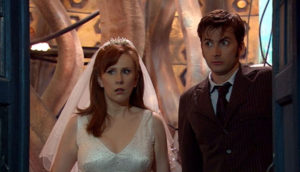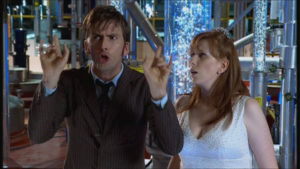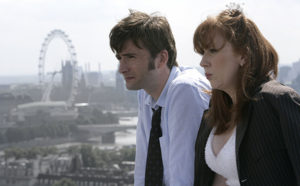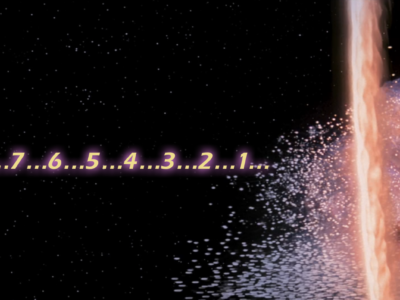Who-ology| S03E00 The Runaway Bride
 “The Runaway Bride”—a Christmas episode—follows immediately on the heels of the season 2 finale: just after losing Rose, the Doctor is thrown into a new adventure. He doesn’t seek it out. It appears right in front of him in the TARDIS, wearing a wedding dress.
“The Runaway Bride”—a Christmas episode—follows immediately on the heels of the season 2 finale: just after losing Rose, the Doctor is thrown into a new adventure. He doesn’t seek it out. It appears right in front of him in the TARDIS, wearing a wedding dress.
And so we meet Donna Noble (played by comedian Catherine Tate) who is the very picture of irony. She is not (as the dictionary defines noble) a stately, admirable and dignified person of exalted moral or mental character; nor is she (as the name Donna denotes) a lady. She is loud, obnoxious, shallow, gullible, crass, self-serving, and–did I mention–loud? She doesn’t let anyone get a word in edgewise; her voice is grating and incessant. She mistrusts the Doctor, making a snap judgment of his character that she allows to direct her treatment of him throughout most of the episode.
The Doctor doesn’t know what to make of Donna at first. She is constantly yelling at him, and drags him into the drama of her life. As it happens, the Doctor is all too happy to oblige. Donna is a mystery (how did she get onto the TARDIS in mid-flight?) and in all sorts of peril (remember the Christmas robots?), so he takes the opportunity to do what he does best—jump in, play detective, be the hero.
I’ve never much liked this episode because of how insufferable Donna is. She’s barely likable, and even that doesn’t come until the end, when you’ve had just about enough of her. We are used to the Doctor’s companions being agreeable, awed by him and what he can offer, full of marvel and wonder and respect. The shift from Rose as companion to Donna (however brief here) is jarring.
But as I watched the episode this time ‘round, with attention and purpose, I could see that the noise created by Donna is perhaps the point. What happens as a matter of plot in this episode is not really intricate, surprising, or clever. One gets the sense that the central point of the episode is, rather, the dynamic between the Doctor and Donna in light of the Doctor’s recent experiences.
 The Doctor is in the throes of grief. We see its presence indirectly, in little shifts and brief quiet spaces in the story. Over the course of this episode, he flip-flops dramatically from contemplative and sorrowful to wild curiosity and excitement. His emotional state is clearly erratic. It is all too easy for him to go back to playing the part he’s always played, drowning out his grief and pain with noise.
The Doctor is in the throes of grief. We see its presence indirectly, in little shifts and brief quiet spaces in the story. Over the course of this episode, he flip-flops dramatically from contemplative and sorrowful to wild curiosity and excitement. His emotional state is clearly erratic. It is all too easy for him to go back to playing the part he’s always played, drowning out his grief and pain with noise.
As a species, humans tend not to deal well with suffering or loss, and that is especially true in the Western World, where prevalent ideologies have lost their mooring to certain realities of the world. While many cultures and systems of belief make meaningful space for the concept of suffering, modern Western society tends to see it only as a road-block: a thing without purpose or place simply to be avoided or eradicated. Christianity offers an alternative to handling suffering—one that finds a balance between realism and optimism, grief and joy.
“[It] teaches that, contra fatalism, suffering is overwhelming; contra Buddhism, suffering is real; contra karma, suffering is often unfair; but contra secularism, suffering is meaningful. There is a purpose to it, and if faced rightly, it can drive us like a nail deep into the love of God and into more stability and spiritual power than you can imagine…While other worldviews lead us to sit in the midst of life’s joys, foreseeing the coming sorrows, Christianity empowers its people to sit in the midst of this world’s sorrows, tasting the coming joy.” Walking with God through Pain and Suffering, Timothy J. Keller (30, 31)
The Doctor is all but ignoring his pain here, and his process through grief has just begun. We can easily see in this episode that avoiding it isn’t doing him any good. Putting aside the pain means he doesn’t have to feel bad, but it also means that he doesn’t feel anything at all. We see this numbness lead him to calloused actions later in the episode, something that the emotional Donna—dramatic at her worst, empathetic at her best—has to bring to his attention.
Rose is gone and the loss will greatly impact the Doctor’s life whether he is willing to let it or not. The same is true of us and our tragedies. We can choose to actively participate in all aspects of our lives–the bad as well as the good—but even if we do not, our experiences will influence the shape of our lives and the way we see the world. After spending all episode consumed by pain or avoiding it at all cost, the Doctor exits the story on a healthier note. There’s no resolution—very often the case in terms of suffering—but there’s a way forward, and it begins with acknowledging and naming the pain.
In the Christian worldview, the inevitability of suffering can be faced with courage, accepting its painful reality even while it works to enrich the soul. The clearest picture of this terrible and beautiful process is found in the person of Jesus, whose suffering is the very thing that made a way for our brokenness to transform into beauty.
“Jesus lost all his glory so that we could be clothed in it. He was shut out so we could get access. He was bound, nailed, so that we could be free. He was cast out so we could approach. And Jesus took away the only kind of suffering that can really destroy you: that is being cast away from God. He took so that now all suffering that comes into your life will only make you great. A lump of coal under pressure becomes a diamond. And the suffering of a person in Christ only turns you into somebody gorgeous.” (180–1)








